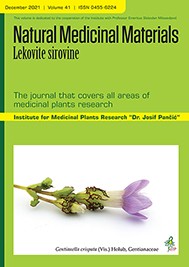Institute for Medicinal Plants Research “Dr. Josif Pančić” , Belgrade , Serbia
Institute for Medicinal Plants Research “Dr. Josif Pančić” , Belgrade , Serbia
Institute for Medicinal Plants Research “Dr. Josif Pančić” , Belgrade , Serbia
Institute for Medicinal Plants Research “Dr. Josif Pančić” , Belgrade , Serbia
Institute for Medicinal Plants Research “Dr. Josif Pančić” , Belgrade , Serbia
Institute for Medicinal Plants Research “Dr. Josif Pančić” , Belgrade , Serbia
Institute for Medicinal Plants Research “Dr. Josif Pančić” , Belgrade , Serbia
Lemon balm (Melissa officinalis L.) is a perennial herbaceous plant widely used in modern and traditional medicine. The aboveground part, particularly the leaves, has many benefits; in traditional medicine, it is used for the preparation of various teas and tea blends, while in modern medicine to obtain essential oil as it is considered a precious product. Nowadays, the needs for lemon balm are mostly met by growing it in the open field. The quality of its leaves as well as the content of its essential oil mostly depend on the way the plant is grown. In stress conditions, medicinal plants use to increase the content of their secondary metabolites. Therefore, this study aimed to determine whether water deficit has an impact on the content of essential oil in lemon balm grown as a pot culture. The experiment was conceived in such a way that at the beginning of the flowering phase, cultivated plants were given different treatments. Treatment A represented plants that were not subjected to water stress, while in treatments B and C, prior to harvesting the plants have been subjected to water stress for 7 and 14 days, respectively. By the end of the experiment, the morphological parameters per plant were measured and the contents of essential oil per treatment determined, all in triplicates. The obtained results indicate that water stress had a great impact on the yield of the aboveground biomass of lemon balm plants as well as on the content of essential oil in their leaves. The highest average yield of the aboveground biomass was obtained in treatment A (1204.0 g) while the highest average yield of the essential oil in treatment C (0.59 g). In short, an increase in water stress increased its positive effects on lemon balm grown as pot culture.
This is an open access article distributed under the Creative Commons Attribution License which permits unrestricted use, distribution, and reproduction in any medium, provided the original work is properly cited.

The statements, opinions and data contained in the journal are solely those of the individual authors and contributors and not of the publisher and the editor(s). We stay neutral with regard to jurisdictional claims in published maps and institutional affiliations.